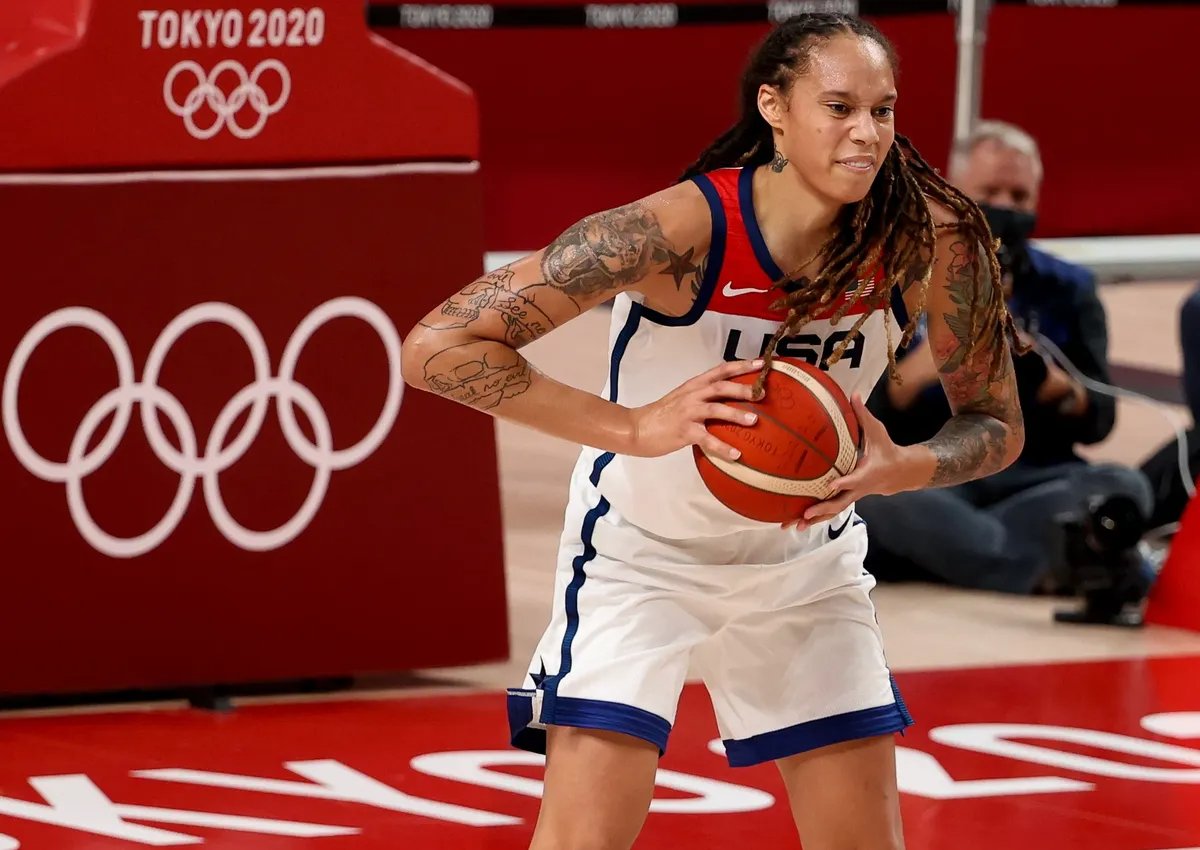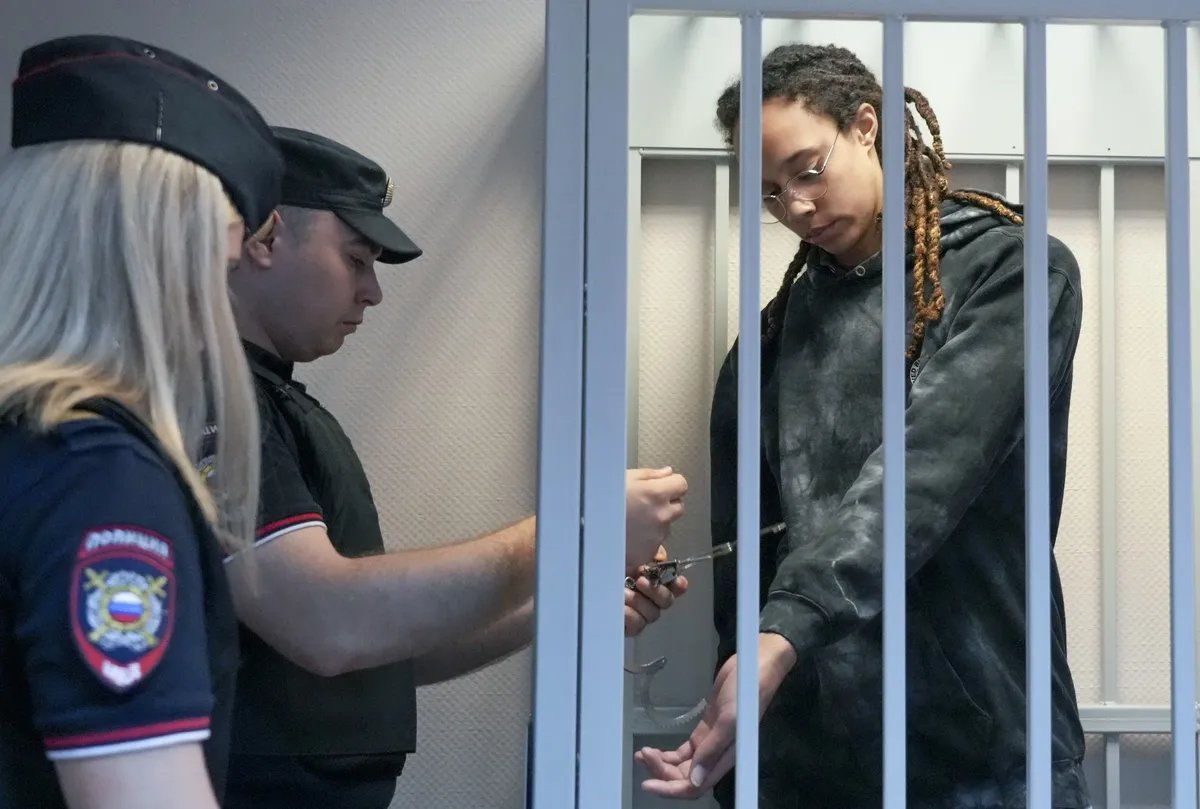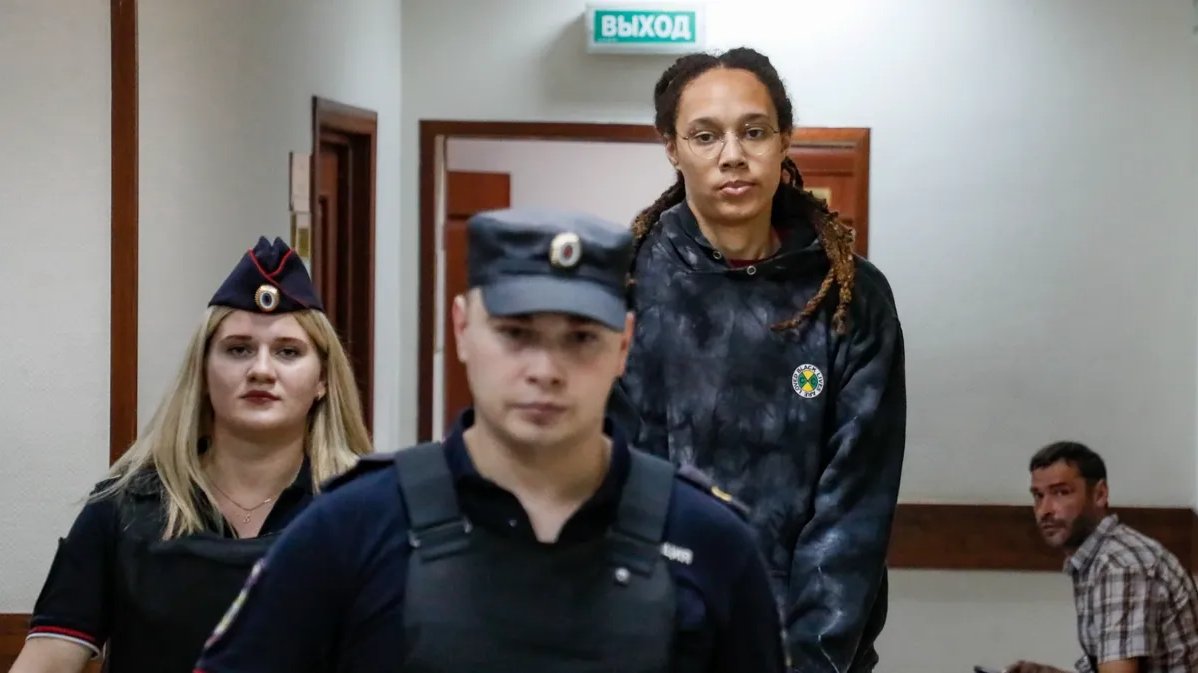A court in the Moscow region continues to hear the case of Brittney Griner, US basketball player and two-time Olympic champion. She stands accused of possessing and smuggling drugs into Russia and has been in a detention centre for more than 5 months. She has pleaded guilty but claimed that she did not intend to violate Russian laws by transporting the prohibited substance. If the court returns a guilty verdict, it is now becoming increasingly likely that Griner will be swapped for Russian national Viktor Bout, the Lord of War, who is now serving his 25-year sentence in a US prison for illegally trading arms and financing terrorism.
Griner, 31, was detained on 17 February in Moscow’s Sheremetyevo Airport where she landed on a flight from New York. A police sniffer dog pointed to her luggage to indicate the presence of suspicious substances there. The search of her backpack and suitcase revealed vape cartridges containing a liquid with a very specific smell. Experts later determined that it was hash oil, a substance prohibited in Russia. The basketball star was arrested on drug charges and is now facing up to 10 years in prison.
From the very beginning, Griner’s case was discussed in the context of a potential prisoner swap. In early May, the US State Department declared her “wrongfully detained”, the status that allows the US side to launch talks on Griner’s release ahead of a court verdict. Meanwhile, Moscow denies that there are any political motives involved in the case.
The US administration recently made a proposal to the Russian authorities to swap Russian Viktor Bout for Brittney Griner and Paul Whelan, who is serving 16 years in a Russian prison for spying, CNN reported, citing its sources.
US Secretary of State Antony Blinken said on 27 July that Washington had made a “substantial proposal” to Moscow regarding Whelan and Griner a few weeks ago. However, Blinken declined to elaborate on the details, noting that he wanted to discuss this issue with Sergey Lavrov, his Russian counterpart, during a phone call. Spokesperson for the Russian Foreign Ministry Maria Zakharova confirmed that the swap talks were ongoing.
Griner’s defense team told RBC, a Russian news outlet, that they had learnt about the negotiations from the news, adding, “a swap is only possible after a court verdict.”
We are BG
Brittney Griner is a global star of women’s basketball. She is a two-time Olympic champion, WNBA champion with Phoenix Mercury, six-time Russian Premier League champion. Standing over two meters tall, she has been successful with Yekaterinburg’s UGMK club in Russia.
The US basketball season is played in summer and early autumn, while the Russian season starts in September. This spring, Griner could have secured her seventh win in the Russian championship with UGMK but the club eventually lost the title for the first time in 14 years without her.

Brittney Greiner during the basketball game between Serbia and the United States at the Tokyo 2020 Olympic Games, August 2021. Photo by Jean Catuffe/Getty Images
Following Griner’s arrest, in March the Yekaterinburg club issued a brief statement. “What happened with Brittney is shocking and troublesome for all members of our team. Our club is ready to facilitate the investigation and provide support to the player who is currently receiving all the required legal assistance.”
The team representatives and leadership only once made it to a court hearing to defend the player and provide a positive profile of her. “Our goal was to speak to the court about her as an athlete and a person. We noted her great role in the club’s success and the development of the whole of Russian basketball. It is thanks to her that we have gone up in the ranking of the Euroleague. We tried to answer the prosecutor’s questions. As of now, Griner’s contract has expired. It happened during the investigation,” Maksim Ryabkov, UGMK Director, told the press about his court appearance.
The US is also on Griner’s case. Players and the WNBA spoke in her defense, Boston Celtics players made statements in June.
They wore shirts with “We are BG” written on them and a QR code with a link to the petition that demands her return to the US.
Brittney’s wife Cherelle (Griner came out in 2013) in turn said that US President Joe Biden can bring the athlete home.
“I just keep hearing that he [Biden] has the power, she’s [Brittney] a political pawn. So, if they’re holding her because they want you [Biden] to do something, then I want you to do it.”
Height didn’t get in the way
On 1 July, the court began hearing the case of Brittney Griner. Almost all seats in the small courtroom are occupied by representatives of the US Embassy in Russia, including Deputy Chief of Mission Elizabeth Rood. Only four seats are allocated for the press, two for Russian journalists and two others for international media. The rest are offered broadcasting.
The prosecution has already presented evidence. It’s the defence team’s turn now. During the hearing on July 26, the lawyers presented a review of the expert conclusion ordered by the prosecution. The review highlights that the expert conclusion “does not meet the criteria of objectiveness, fairness and comprehensiveness” and “cannot be accepted as scientifically sound.” In particular, it was not determined how much of the narcotic substance was found in the hash oil that Griner had brought into Russia. Meanwhile, prosecutor Nikolai Vlasenko told the court that it was 0.702 grams, “a significant amount.”

Brittney Greiner during a hearing in the Khimki court. Photo by Pavel Pavlov / Anadolu Agency / Getty Images
Brittney Griner herself pleaded guilty in the beginning of the case and stressed that she had not intended to break Russian laws. She was rushing when packing up for the flight, while the vape cartridges containing hash oil ended up in her bag by accident, according to her.
On 27 July, it was Griner’s turn to testify. The broadcast showed Griner escorted into the defendant’s cage. The basketball player almost did not fit and could not stand upright in it, judge Anna Sotnikova allowed her to testify sitting down. As soon as the hearing began, the broadcast screen went dark with only a barely discernible audio from the courtroom available.
With the help of a translator, Griner told the court that in February she was on holiday in Phoenix, she did not have any games in the off-season. She was travelling to Moscow with layovers. She was meant to fly to Yekaterinburg from Sheremetyevo Airport. The flight lasted 12 hours. “I was exhausted after Covid, the flight was difficult as well. I did not feel well and could barely walk,” Griner said, adding that her return to Russia was not easy in the aftermath of Covid and because of jetlag.
According to her, she tried to make her way into the transit zone in Sheremetyevo when she was stopped at customs control. She was checked by a woman with a sniffer dog and then asked to put her luggage through the scanner. Griner was next asked to open her bag. “The woman took out two cartridges from the suitcase and then signaled to another man,” the defendant continued. That is how the vape story began.
Griner said that although she was provided with a translator only short words were translated to her, with mostly instructions explaining where to put her signature. Moreover, she was not told what her rights were or what the documents she was signing were.
Griner was then escorted to a room of the case officer. He did not really know how to translate the contents of another pile of papers and only told her, “It basically says that you are guilty.” Griner testified that she could only meet with her lawyer late at night.
The basketball star admitted that it was hash oil that was found in her luggage, while tests results showed no trace of drugs in her system. When asked why she brought the drugs with her, Griner said that she did not “intentionally transport them and does not understand how these substances ended up in her baggage” and she “did not intend to violate Russian laws.” The player explained that she was prescribed cannabis and got it in a pharmacy in Arizona. “Over the course of my long career, I have sustained a lot of injuries: my spine and knees are injured, I broke my ankle before. The medicinal cannabis is more effective than other painkillers, it does not have side effects like pills,” Griner said. “I only used cannabis for pain relief when my knee was flaring up and only in the off-season when there are no games.”
The defendant said that she understands why she stands accused and realises that she is responsible for what happened. “But I did not intend to smuggle anything and was not going to store prohibited substances.”

Fans hold up "Bring Brittney Home" signs during a rally in support of Greiner. Arizona, July 6th. Photo by Christian Petersen / Getty Images
Following the testimony, the lawyers asked the court to grant Griner a phone call to the embassy to speak with her family. She has not been able to communicate with her parents or wife while in custody. In turn, the judge told the defendant to write a request for a phone call.
The judge then adjourned the hearing until the evidence, vape cartridges, can be delivered before the court. The evidence is expected to be examined at a later date. Moreover, there is an issue with summoning the expert who provided a review for the defence team. He is summoned again to speak to the court at the next hearing scheduled for 2 August.
Join us in rebuilding Novaya Gazeta Europe
The Russian government has banned independent media. We were forced to leave our country in order to keep doing our job, telling our readers about what is going on Russia, Ukraine and Europe.
We will continue fighting against warfare and dictatorship. We believe that freedom of speech is the most efficient antidote against tyranny. Support us financially to help us fight for peace and freedom.
By clicking the Support button, you agree to the processing of your personal data.
To cancel a regular donation, please write to [email protected]

